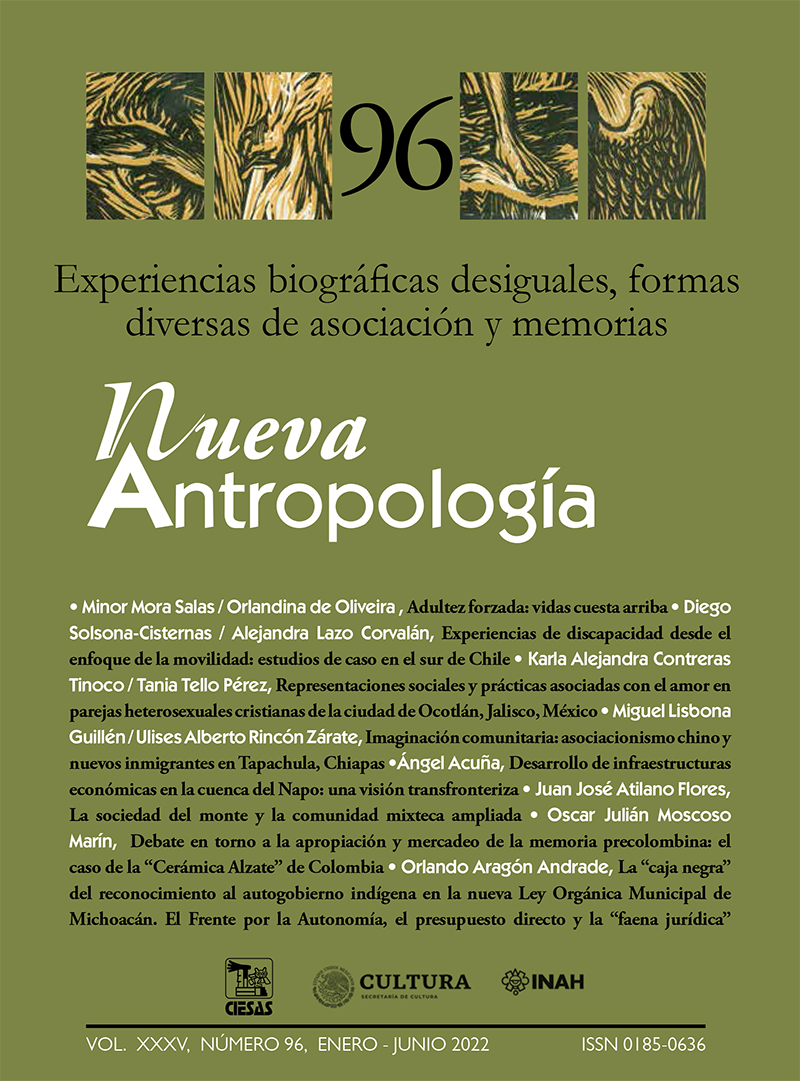Vol. 35 No. 96 (2022): Experiencias biográficas desiguales, formas diversas de asociación y memorias
Artículos
Published 2023-10-28
Keywords
- biographic narrative, transition to adulthood, turning points, impoverishment, youths.
How to Cite
Adultez forzada: vidas cuesta arriba. (2023). Nueva Antropología, 35(96), 10-32. https://revistas.inah.gob.mx/index.php/nuevaantropologia/article/view/20049
Abstract
We study the life trajectory of a group of impoverished working-class youths, during the present century, to understand how the overdue assumption of family responsibilities or their survival agency lead to a compelled transition to adult life, which we call ‘compelled adulthood’. We focus the analysis on two polar types to identify the triggering factors of this phenomenon, the ways it unfolds and its effects on the life chances of these young people. We highlight the high costs that life experience imposes on youths who has faced severe hardship since their childhood and how they thrive to cope with.
Downloads
Download data is not yet available.
References
- BERGER, Ronald J. (2008), “Agency, Structure and the Transition to Disability: A Case Study with Implications for Life History Research”, The Sociological Quartely, vol. 49, núm. 2, pp. 309-333.
- CAPRIATI, Alejandro J. (2014), “Una aventura abierta. Acontecimientos biográficos de jóvenes residentes en villas y barrios populares del Gran Buenos Aires, Argentina”, Última Década, vol. 22, núm. 40, pp. 109-129.
- CASAL, Joaquim et al. (2006), “Itinerarios y trayectorias. Una perspectiva de la transición de la escuela al trabajo”, Trayectorias, vol. 8, núm. 22, pp. 9-20.
- ________, Rafael MERINO y Maribel GARCÍA (2011), “Pasado y futuro del estudio sobre la transición de los jóvenes”, Papers, vol. 96, núm. 4, pp. 1139-1162.
- CHAVES, Mariana, Sebastián FUENTES y Luisa VECINO (2016), Experiencias juveniles de la desigualdad. Fronteras y merecimientos en sectores populares, medios altos y altos, Buenos Aires, Grupo Editor Universitario.
- DU BOIS-RAYMOND, Manuela (1988), “´I Don´t Want to Commit Myself Yet’: Young People’s Life Concepts”, Journal of Youth Studies, vol. 1, núm. 1, pp. 63-79.
- ECHARRI, Carlos y Julieta PÉREZ (2007), “El tránsito hacia la adultez: eventos en el curso de vida de los jóvenes en México”, Estudios Demográficos y Urbanos, vol. 22, núm. 1, pp. 43-77.
- EVANS, Karen (2002), “Taking Control of their Lives? Agency in Young Adult Transitions in England and the New Germany”, Journal of Youth Studies, vol. 5, núm. 3, pp. 245-269.
- FURLONG, Andy (2009), “Revisiting Transitional Metaphors: Reproducing Inequalities under the Conditions of Late Modernity”, Journal of Education and Work, vol. 22, núm. 5, pp. 234-353.
- ________, Fred CARTMEL y Andy BIGGART (2006), “Choice Biographies and Transitional Linearity: Re-conceptualising Modern Youth Transitions”, Papers, vol. 79, pp. 225-239.
- FURSTENBERG, Frank (2006), “Diverging Development: The Not-so-Invisible Hand of Social Call in the United States”, paper presented at the biennial meeting of the Society for Research on Adolescense, San Francisco, California, marzo 23-26.
- HEINZ, Walter (2009), “Structure and Agency in Transition Research”, Journal of Education and Work, vol. 22, núm. 5, pp. 391-404.
- HELD, Thomas (1986), “Institutionalization and Deinstitutionalization of the Life Course”, Human Development, vol. 29, núm. 3, pp. 157-162.
- HITLIN, Steven y Monica K. JOHNSON (2015), “Reconceptualizing Agency within the Life Course: The Power of Looking Ahead”, American Journal of Sociology, vol. 120, núm. 5, pp. 1429-1472.
- HOLLAND, Janet y Rachel THOMSON (2009), “Gaining Perspective on Choice and Fate”, European Societies, vol. 11, núm. 3, pp. 451-469.
- JOHNSON, Guy y Philip MENDES (2014), “Taking Control and ‘Moving On’: How Young People Turn Around Problematic Transitions from Out-of-Home Care”, Social Work & Society, vol. 12, núm. 1, pp. 1-15
- KAUFMAN, Peter (2005). “Middle-Class Social Reproduction: The Activation and Negotiation of Structural Advantages”, Sociological Forum, vol. 20, núm. 2, pp. 245-270.
- MACHADO PAIS, José (2007), Chollos, chapuzas, changas. Jóvenes, trabajo precario y futuro, Barcelona, Anthropos.
- MARTÍNEZ, Juliana (2008), ¿Arañando bienestar? Trabajo remunerado, protección social y familias en América Central, Buenos Aires, Clacso.
- MORA-SALAS, Minor y Orlandina de OLIVEIRA (2022), Entre la desilusión y la esperanza: jóvenes en una sociedad desigual, México, El Colegio de México.
- OLIVEIRA, Orlandina de y Minor MORA-SALAS (2008), “Desigualdades sociales y transición a la adultez en el México contemporáneo”, Papeles de Población, vol. 14, núm. 57, julio-septiembre, pp. 117-152.
- PAUGAM, Serge (2012), “Protección y reconocimiento. Por una sociología de los vínculos sociales”, Papeles del CEIC, núm. 2, pp. 1-19.
- RAUSKY, María Eugenia (2014), “¿Jóvenes o adultos? Un estudio de las transiciones desde la niñez en sectores pobres urbanos”, Última Década, vol. 22, núm. 41, pp. 11-40.
- REIMER, Daniela (2014), “Subjective and Objective Dimensions of Turning Points”, Social World & Society, vol. 12, núm. 1, pp. 1-19.
- SARAVÍ, Gonzalo (2015), Juventudes fragmentadas. Socialización, clase y cultura en la construcción de la desigualdad, México, Flacso-México/CIESAS.
- THOMSON, Rachel et al. (2002), “Critical Moments: Choice, Chance and Opportunity in Young People´s Narratives of Transition”, Sociology, vol. 36, núm. 2, pp. 335-354.
- WOODMAN, Dan y Johanna WYN (2015), “Class, Gender and Generation Matter: Using the Concept of Social Generation to Study Inequality and Social Change”, Journal of Youth Studies, vol. 18, núm. 10, pp. 1402-1410.

